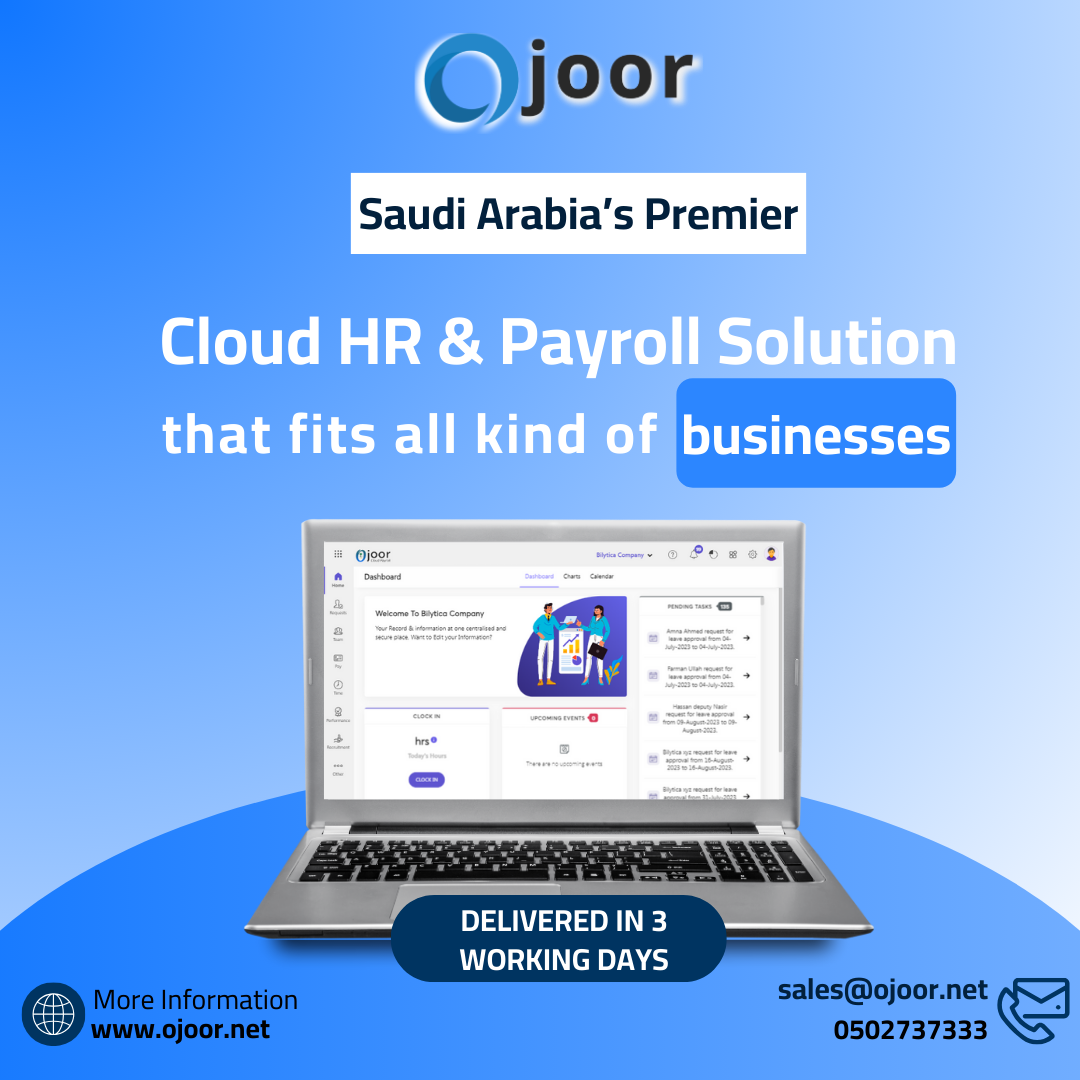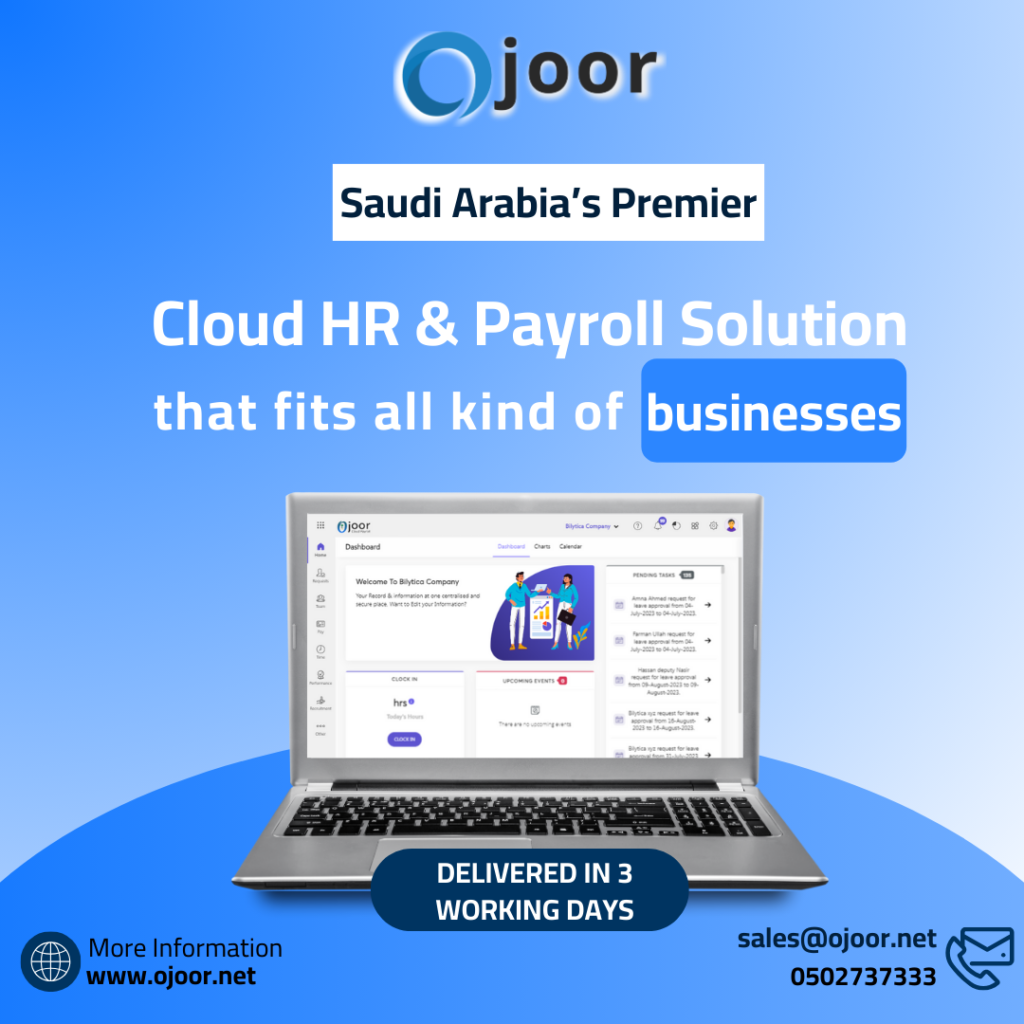Ojoor # 1 is one of the top Employee Management System in Saudi Arabia and is integral to the functioning of modern businesses, automating and streamlining various administrative and operational processes. One of the critical functionalities of EMS platforms is payroll processing, which involves the calculation, distribution, and reporting of employee salaries and wages. In Saudi Arabia, payroll processing through EMS platforms is influenced by specific labor laws, taxation policies, and cultural considerations. This article delves into how EMS platforms manage payroll processing in the Saudi Arabian context, highlighting the key features, legal compliance, and benefits to organizations.
Click to Start Whatsapp Chatbot with Sales
Mobile: +966547315697
Email: sales@Ojoor.net
Ojoor #1 Employee Management System in Saudi Arabia

Overview of Payroll Processing
Employee Management System in Saudi Arabia processing encompasses several tasks including calculating wages based on working hours, accounting for deductions and benefits, and ensuring timely salary disbursements. It also involves generating pay slips, maintaining payroll records, and ensuring compliance with local regulations.
Legal and Regulatory Framework
Saudi Labor Law
Saudi Arabia’s labor law, governed by the Ministry of Human Resources and Social Development (HRSD), stipulates detailed provisions regarding employee wages, working hours, overtime, leave entitlements, and end-of-service benefits. EMS platforms are designed to integrate these legal requirements, ensuring that payroll processing is compliant with national labor standards. Key aspects include:
- Wage Protection System (WPS): Introduced to ensure that private sector workers receive their salaries on time. EMS platforms must be able to interface with the WPS to submit payroll data electronically.
- GOSI (General Organization for Social Insurance): Contributions to social insurance are mandatory, and EMS platforms facilitate automatic deductions and submission of GOSI reports.
- Zakat, Tax, and Customs Authority (ZATCA): The introduction of VAT and other taxes requires EMS platforms to handle tax calculations and compliance effectively.
Features of EMS Platforms in Payroll Processing
Automated Salary Calculation
EMS platforms automate the calculation of salaries, taking into account various factors such as base pay, overtime, allowances, deductions, and bonuses. The automation minimizes errors and ensures accurate payroll.
Compliance Management
Compliance with Saudi labor laws is a critical function. EMS platforms are programmed to adhere to the Wage Protection System (WPS) by generating payroll files compatible with the requirements of the HRSD. This ensures that employees are paid according to the stipulated timelines and amounts.
Integration with Banking Systems
Seamless integration with banking systems is another essential feature. EMS platforms generate salary files in the required formats for direct bank transfers, ensuring timely disbursement of wages.
Tax Calculation and Reporting
EMS platforms automate tax calculations based on the latest regulations from ZATCA. They generate necessary tax reports, ensure compliance with VAT and other applicable taxes, and facilitate easy submission to the authorities.
Employee Self-Service Portals
Many Employee Management System in Saudi Arabia platforms offer self-service portals where employees can access their pay slips, tax documents, and other payroll-related information. This enhances transparency and reduces the administrative burden on HR departments.
Leave and Attendance Management
Integrated leave and attendance management systems ensure that payroll calculations accurately reflect the time worked and leave taken. This is crucial for ensuring fair and accurate compensation.

Benefits of Using EMS Platforms for Payroll Processing
Accuracy and Efficiency
Automation reduces human error, ensuring accurate payroll processing. It also significantly cuts down the time required for payroll administration, allowing HR System in Saudi Arabia personnel to focus on strategic tasks.
Legal Compliance
EMS platforms are regularly updated to comply with changing labor laws and tax regulations, mitigating the risk of non-compliance and associated penalties.
Data Security
Payroll information is highly sensitive. EMS platforms provide robust security measures, including encryption and access controls, to protect employee data.
Cost Savings
By automating payroll processes, organizations can reduce the costs associated with manual processing, including errors, administrative overheads, and compliance-related fines.
Challenges in Payroll Processing
Despite the benefits, there are challenges associated with payroll processing in Saudi Arabia. These include:
- Regulatory Changes: Keeping up with frequent changes in labor and tax laws requires EMS platforms to be continuously updated.
- Localization: Customizing LMS training platforms to handle specific local requirements, such as the Saudi WPS and GOSI contributions, can be complex.
- Integration Issues: Ensuring seamless integration with various banking systems and other internal systems can be challenging.
Conclusion
EMS platforms play a crucial role in managing payroll processing in Saudi Arabia, ensuring accuracy, efficiency, and compliance with legal requirements. By automating complex calculations, integrating with banking and government systems, and providing robust data security, these platforms help organizations streamline their payroll processes and reduce administrative burdens. Despite challenges such as regulatory changes and integration complexities, the benefits of EMS platforms in payroll processing are significant, making them indispensable tools for modern businesses in Saudi Arabia.
Click to Start Whatsapp Chatbot with Sales
Mobile: +966547315697
Email: sales@Ojoor.net
Employee Management Software in Saudi Arabia
Employee Management Software in Saudi Arabia
Employee Management Software in Saudi Arabia
Employee Management System in Saudi Arabia handle payroll similar software solutions prices were updated on 2026-02-08T22:49:48+00:00 in Saudi Arabia in Mecca, Medina, Riyadh, Khamis Mushait, Yanbu, Jeddah, Dammam, Unaizah, Uqair, Ha’il, Ta if, Al Bahah, Dhahran, King Abdullah Economic City, Najran, Diriyah, Qatif, Khafji, Jubail, Abqaiq, List of Cities and Towns in Saudi Arabia, Ras Tanura, Turubah, Jazan Economic City, Knowledge Economic City, Medina, Khobar, Abha, Tabuk, Saudi Arabia, similar software solutions prices were updated on 2026-02-08T22:49:48+00:00 We also provide in Saudi Arabia services solutions company in Hafar Al-Batin, Udhailiyah, Al-Awamiyah, Hofuf, Hautat Sudair, Buraidah, Tayma, Duba, ‘uyayna, Saihat, Al-Kharj, Al-ula, Jizan, Rumailah, Ar Rass, Arar, Shaybah, Al Majma’ah, Rabigh, Dhurma, Haradh, List of Saudi Cities by Gdp Per Capita, Badr, Sudair Industrial City, Baljurashi, Shaqraa, Al-Khutt, Habala, Ad Dawadimi, Dawadmi, Layla, similar software solutions prices were updated on 2026-02-08T22:49:48+00:00 Price is SAR 100 and this was updated on updated on 2026-02-08T22:49:48+00:00 similar Employee Management System in Saudi Arabia handle payroll software solutions prices were updated on 2026-02-08T22:49:48+00:00 in Saudi Arabia in Haql, Afif, Al-Abwa, Farasan, Al-Jaroudiya, Thadig, Al-Thuqbah, Al Wajh, Almardmah, Al-Zilfi, Muzahmiyya, Prince Abdul Aziz Bin Mousaed Economic City, Tharmada’a, Skaka, Um Al-Sahek, Sharurah, Tanomah, Bisha, Dahaban, Al Qunfudhah, Qurayyat, Saudi Arabia, Ha’ir, as Sulayyil, Al Lith, Turaif, Al-Gway’iyyah, Samtah, Wadi Ad-Dawasir, Az Zaimah, Safwa City, Jalajil, Harmah, Mastoorah, Hotat Bani Tamim, Jabal Umm Al Ru’us, Rafha, Qaisumah, Al-Ghat, Hajrah, Al-Hareeq. Excerpt: Jeddah (also spelled Jiddah, Jidda, or Jedda; Arabic: Jidda) is a Saudi Arabian city located on the coast of the Red Sea and is the major urban center of western Saudi Arabia similar software solutions prices were updated on 2026-02-08T22:49:48+00:00 Price is SAR 100 and this was updated on updated on 2026-02-08T22:49:48+00:00
6-24-2024



